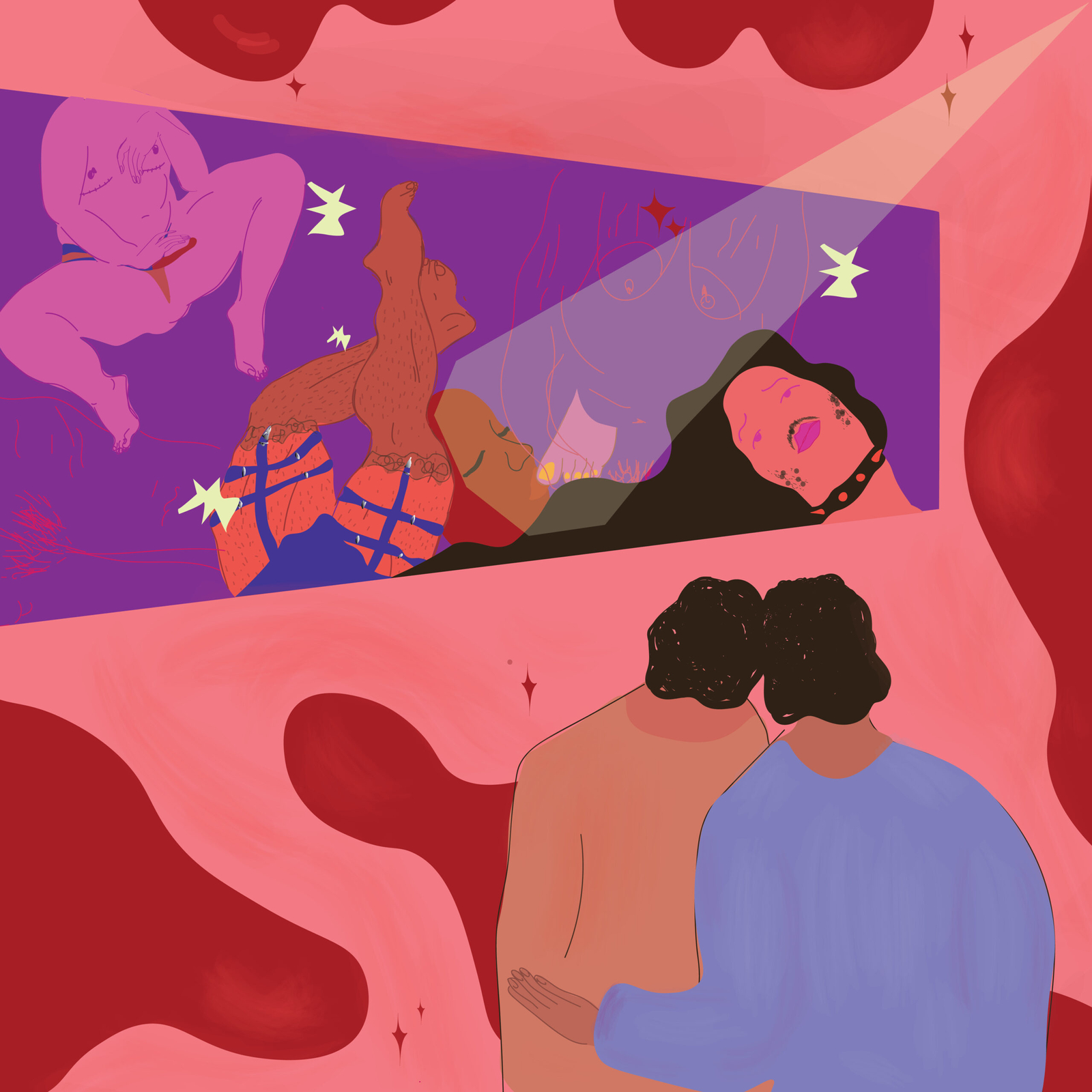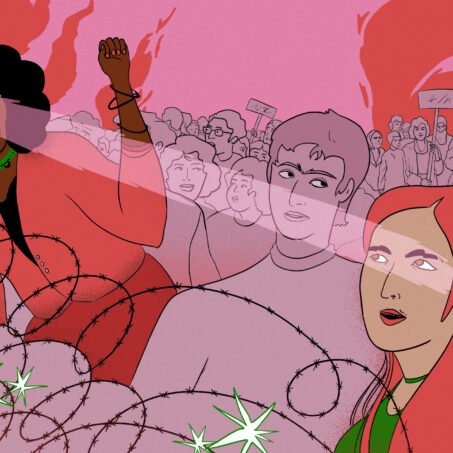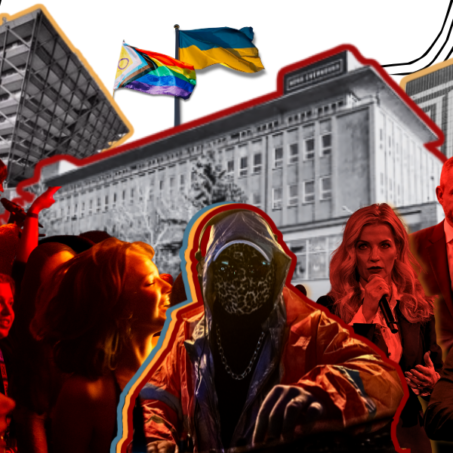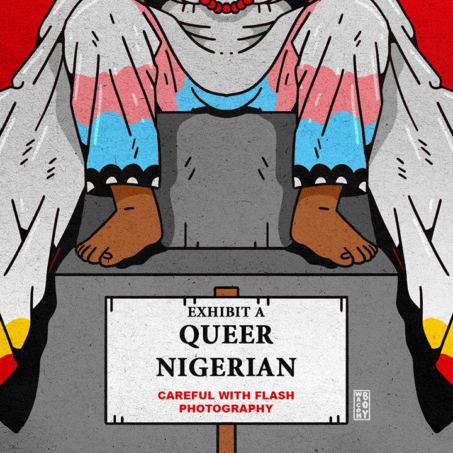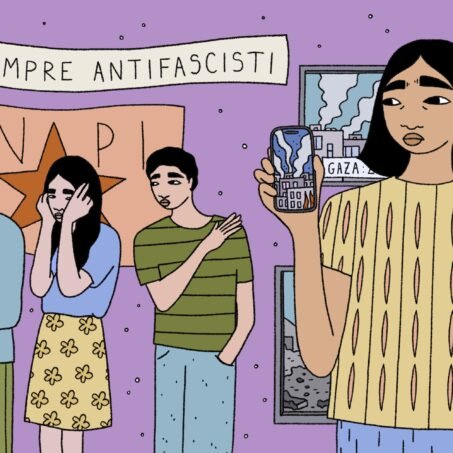It’s hard to imagine a world without porn. As someone who went through puberty as part of the first internet generation, my first sexual experience, like that of many of my peers, occurred in front of a screen.
Porn went on to play an important role in my adolescence. Bored afternoons were spent on Chatroulette, and most sleepovers ended passively watching Babestation. With half of adults in the UK regularly watching porn, it is no wonder that a lot of people were disappointed, but not exactly surprised, when porn reared its head in the UK’s Houses of Commons?
When something is this ubiquitous it’s often hard to assess the effect that it’s having, either on you personally, or on society at large. Porn specifically. However, that doesn’t necessarily mean that critical conversations around the subject aren’t happening. Amia Srinivasan, author of A Right to Sex, asks us: is porn a tool of the patriarchy or can it be used to counter sexual repression?
And it’s a difficult question. One so divisive in fact that it split the 90s feminist movement and still divides feminists today. However, with Pornhub removing 80% of its content in 2020 due to claims of non-consensual and underage footage, and ‘revenge porn’ so commonplace it’s been the “new normal”, can porn, which has a reputation for reinforcing heteronormativity and normalising violence against women and other gender-based inequalities, really play a positive role in our society?
Post Pxrn Film Festival Warsaw
One collective which has a strong opinion on this is the Post Pxrn Film Festival in Warsaw, a five day event which showcases films from all over the world that fall into a category known as Post-porn. This does not refer to the mainstream porn widely available on sites such as RedTube, but instead creates a new genre. Aga Szreder, co-founder of the festival, defines post-porn as “feminist porn, it’s queer porn, it’s eco-sexuality porn,” as we catch up over Zoom with her co-founder Rafał Żwirek. “It’s all of these terms using one word.”
Post-porn, a term which asserts the body as a site of revolutionary politics, was first coined by sexologist Annie Sprinkle over 30 years ago, and not only forms the title of the festival but the ethos which defines it.
“Post-porn is a good term for what we’d like to give people access to,” explains Żwirek. “Through the festival we can hopefully help give people a place in society. In Poland especially, minorities need support. Trans people, for example, are public enemy number one right now.”
Evidence of this is also already being seen by politicians who have been spewing anti-trans hate speech in hope of drumming up public support for the election taking place this Autumn. Zwirek continues, “so we want to show the kind of work minoritised groups are doing, but also instil courage in these communities to show their own work. This was our dream when starting the festival – but our reality became so much bigger.”
The reality he’s referring to was 7,000 people across the four different halls of Muranów cinema over five days. Films such as El Triunfo de Sodoma kicked off the proceedings, promising to act as a “call for the final release of sexuality from binary traps.” Another block of movies followed on the theme of radical closeness, exploring perisexual practices such as partner communication.
And the festival didn’t stop at films. A programme of events included panel discussions on topics related to how men can learn tenderness with each other, to how we can reframe sexual pleasure from the lens of the female body.
Religious conservatism and the censoring of sex education
The Post Pxrn Festival becomes even more pioneering when you remember that it’s not taking place in a Berlin warehouse, but rather in the middle of Warsaw.
“LGBT-Free zones,” although not legal, do exist within Poland, and cause many in the queer community to experience discrimination and harassment. Women are also increasingly facing persecution, with abortion rights groups dealing with bomb threats after protesting Poland’s strict laws surrounding reproductive health.
I ask the pair about how the festival sits within the wider Warsaw context. “You know, Poland is a very strange country; everything is upside down here,” says Aga. “In the 90s, Poland went crazy with porn on video cassettes and that legacy endures today. It’s quite funny, because on one hand you have a large porn watching culture, and then on the other there is pervading Catholic oppression.”
With 86.9% of Poland’s population identifying as Roman Catholic, and those numbers set to rise due to the current Catholic right revival, the juxtaposition does seem odd. However, as we move on to discuss Poland’s current sex education, the country’s porn habit starts to make sense.
“Sex education just doesn’t exist,” says Zwirek. “The right wing government has completely erased it. You now only have a class called ‘Family Preparation’, but obviously it’s only the cis-het family you’re preparing for.”
“It’s also impossible for NGOs to get into schools to teach sex ed now,” adds Aga. “It’s completely run by priests and nuns.” This chaste gatekeeping of sexual education was reinforced by a bill that came into effect in 2019 which was supported by citizens under the brand of the Stop Peadophilia Project. Under it, teachers who (rightly) tell their students that masturbation is a perfectly normal activity could face up to two years in jail.
“Lack of education in school means that porn becomes a big teaching tool,” explains Aga, underlining that natural curiosity about sex might be one of the reasons that porn is still popular in the country despite the pervading Catholic dogma concerning premarital abstinence. “It’s one of the reasons that we wanted to do this festival – to take the power away from institutions like the church and provide other spaces and mediums for people to be exposed to conversations about sex.”
A regression in attitudes towards sex
However, attitudes towards sex and sex education weren’t always so restricted. Under communism Poland enjoyed much more liberal attitudes towards sexual policies.
Not only was abortion legal behind the Iron Curtain, but there were also laws in place to protect rape victims and there was a much more relaxed approach to gender identity. The female orgasm became an object of study, with Michalina Wisłocka publishing Sztuka Kochania (The Art of Loving), in 1978, making it the first marital sex guide of its kind to emerge from a communist country. While the book wouldn’t stand up to today’s feminist standards, it remains an ode to Poland’s comparative forward thinking attitudes.
In a remarkable U-turn, which happened in just over a generation, the state line in Poland now closely echoes that of the Catholic Church. Even supposed non-partisan institutions such as The Polish Academy of Science have publicly come out against proposed ‘gender workshops.’

Join our mailing list
Sign up for shado's picks of the week! Dropping in your inbox every Friday, we share news from inside shado + out, plus job listings, event recommendations and actions ✊
Sign up for shado's picks of the week! Dropping in your inbox every Friday, we share news from inside shado + out, plus job listings, event recommendations and actions ✊
This vastly different generational experience of sexual and reproductive rights is potentially the reason for another of the Post Pxrn Festivals’ irregularities: its intergenerational nature.
“There was this 75 year old couple who attended the festival who I got speaking to,” says Aga. “In the evening, the woman came up to me and said ‘thank you’ – because through our stance on sex we had created a space which more closely resembled the Poland they remembered. They told me that they can’t live in Poland anymore, but they’ll come back just for the festival.”
Representing ethical porn in the mainstream
So, as evidenced through the festival’s existence, ethical porn does exist, and is growing in popularity, so how do we transfer this interest into the mainstream?
The founders have a few ideas. “Through the festival, our audience has learnt to see porn differently. They have discovered a rich language to talk about sex, consent and relationships in a new way,” says Zwirek.
Natalia Sara Skorupa, a Polish filmmaker who exhibited at the festival, also speaks to the unique space the festival holds. “I was so glad that someone wanted to show my film and not call me crazy!” she says. “It was wonderful that I could sit in the cinema and watch porn for a few days with strangers!”
“This is a beautiful initiative that promotes equality”, she adds, speaking to the wider effects the festival has, beyond those experienced by attendees and exhibitors. “It is an opportunity to abolish taboos and stigma. God, maybe even people in Poland will stop being ashamed of sex!” she laughs. “The festival is also an important chance to talk about sex workers as they are, that they are doing work, that they are not demons from hell!”
The humanisation of sex workers is something Zwirek underlines as key to the festival and believes that points to the effect that seeing and meeting performers in real life has on people’s attitudes towards porn. “We had a lot of performers doing Q&A” he explains. “So the audience got a chance to meet them and realise that they were more than their on-screen characters.” It’s simple enough; humanisation breeds understanding, and this is what Post-Pxrn intends to do.
Challenging the binary
Another idea which Aga and Zwirek implemented, which both founders think is vital in encouraging people to move people away from mainstream porn, is their efforts to de-categorise their content. “We decided not to build ghettos,” explains Zwirek. “We wanted to mix everything up, so there was no one place for lesbian films or for gay films – everything sat together.”
This idea, while initially confusing a lot of their patrons, ended up having an educational effect. “It meant some people watched gay porn for the first time,” says Zwirek. “And they discovered that while it might be two different bodies, they still make love, they still have fun.”
“It was one of many steps to connect people, to show a spectrum of sexuality and bodies,” continues Aga.
This decategorisation, which seemed to work well for the festival go-ers, might also be the key to making mainstream porn more ethical.
While online porn certainly does cater for every taste, Shira Tarrant, author of The Pornography Industry reminds us that algorithms define our porn tastes just as much as they curate our suggested content on Instagram.
She continues to explain the result: “the ‘Teen’ section of porn sites stays the most popular, and of the top 20 most popular stars on PornHub in 2017, all but two were white, and all were slim, able-bodied, femme, cis and waxed to pre-pubescent hairlessness.” This still largely rings true today.
Other than uncovering this disturbing Lolita-like trend, it also creates a system, as discussed in A Right to Sex, where women who are “too old” to feature in this category, yet “too young” to star as ‘MILFs’, find it hard to book gigs. This means that categorisation is not only negatively affecting porn consumers, but also its actors.
The future of porn
But it’s not all doom and gloom, as ethical porn is edging its way into the mainstream. As well as the crucial space being carved out by the Post-Pxrn Festival, in the last decade, multiple initiatives have sprung up to ensure that porn is moving in a more ethical direction. For example, sites like Proof of Peach are advocates of block-chain porn which gives creators better control of their content.
Feminist porn creators are also on the rise, with companies like Lust Cinema featuring on-set intimacy coaches and providing proper care for their performers. And overall, studies find that millennials are more likely than previous generations to pay for porn, with the hope being that this trickles down to benefit the performers.
So, with the global rise of attacks – from hate speech to policy changes – on both reproductive rights and the rights of trans and gender-nonconforming people, it’s clear that despite whether the world is ready for ethical porn or not, it desperately needs it.
What can you do?
- Read A Right to Sex by Amia Srinivasan
- Check out the Post Pxrn website, and start planning your trips to Poland for the 2023 iteration!
- Listen to Hot Money, which shows the shady underside of the mainstream porn industry
- Listen to this podcast episode between Owen Jones and Amia Srinivasan on The Right to Sex, Me Too, incels and pornography
- Explore ethical porn! From Dipsea to Make Love Not Porn, there are so many sites out there.
- Read more about sex work, porn and intersectional feminism on shado
